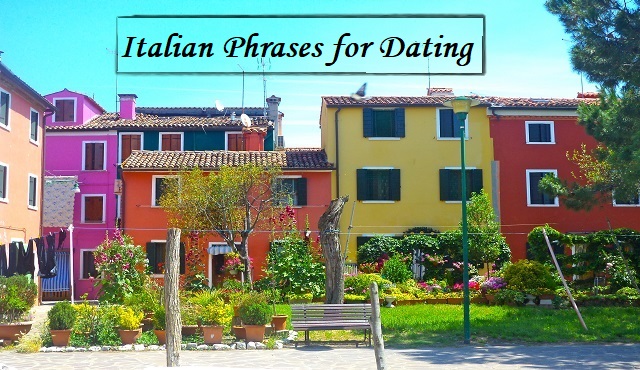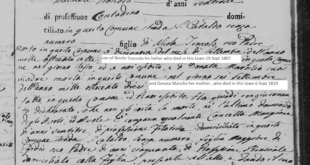
Today in America, we “date,” “go out on a date,” or refer to two people who are “dating,” from the first romantic encounter until they become married. After marriage, a couple can still go out on “date nights.” But be careful when translating American romantic experiences into Italian! The English verb “to date” as used in America today to refer to a romantic relationship does not have a literal translation in Italian.
Of course, “to court” a woman was common in past centuries, and the Italian language still reflects this. When a man tries to show he is interested in a woman, the phrase “fare la corte a…” is used from the verb corteggiare or “to court.” For instance, “Marco fa la corte a Maria,” is translated literally as “Mark is courting Maria,” with the connotation that he is “pursuing” her or trying to “win” her love.
The verb corteggiare can also be used figuratively, between any two adults, to describe when one is trying to cajole, flatter, or entice another, usually to “convince” them to do something. “Marco corteggia il proprietario alla festa perché vuole un aumento di stipendio.” “Mark flattered the owner at the party because he wanted an increase in his salary.”
There is a verb still in use in Italy today that refers to a man seducing, or “winning over,” a woman: “conquistare… ” such as, “Marco ha conquistato Maria.” If Maria lets herself be “won over” or “captivated” by Marco, she can use the phrase, “Mi lascio conquestare da Marco.”
In today’s vernacular, if one wants to allude to the fact that they are dating, or “seeing” someone special in the Italian language, the following phrases can be used:
| “Mi vedo con un ragazzo.” “Mi vedo con una ragazza.” |
“I’m seeing a boy.” “I am seeing a girl.” |
| “Esco con un ragazzo.” “Esco con una ragazza.” |
“I’m going out with a boy.” “I’m going out with a girl.” |
| “Il ragazzo con cui ho/avevo appuntamento/date.” “La ragazza con cui ho/avevo appuntamento/date.” |
“The boy with whom I have/had an appointment/date.” “The boy with whom I have/had an appointment/date.” |
It should be noted that ragazzo and ragazza also translate into boyfriend and girlfriend. To let another know you have a boyfriend or girlfriend, simply say, “Ho un ragazzo,” or “Ho una ragazza.”
Also, you’ll notice that from the above translations that the Italian noun appuntamento does double duty, since it corresponds to both appointment and date. In English, the word appointment is generally used to refer to a business meeting or a formal meeting in general, often between people who do not know each other well. The noun “date” can be used to describe a general meeting between friends, and is always used when one wants to imply a romantic interest.
Italian can be used to refer to regular romantic “get togethers” before marriage with the phrase “to go out with someone”—“uscire con qualcuno.” “Io esco con Marco ogni sabato sera,” means, “I go out with Mark every Saturday night,” and implies, “I go out on a (romantic) date with Mark every Friday night.”
The Italian verb “frequentarsi,” which means “to spend time with each other” can also be used to describe a special relationship. Frequentarsi can also be translated as “to see each other” or “to date each other” in the romantic sense or simply to “to hang out with” friends. The non reflexive form, frequentare, means “to frequent” or “to visit” a certain place.
Some examples of how to use the Italian verbs that describe a special relationship are listed in the table below. Remember that ci and si in these examples stand for “each other.” For a refresher on how to use reciprocal reflexive verbs, visit our blog in this series called Italian Reciprocal Reflexive Verbs.
| Marco e io ci frenquentiamo. | Mark and I are spending time with each other. (romantically) Mark and I are seeing each other (romantically) Mark and I are dating each other. |
| Noi ci frequentiamo il sabato sera. | We are seeing each other/dating every Saturday night. |
| Marco e Maria si fequentano. | Mark and Maria are dating each other. |
| Loro si frequentano ogni venderdì sera. | Mark and Maria see each other/ going out on a date every Friday night. |
| Marco frequenta il Ristorante Paolo il sabato. | Mark frequents/goes to Ristorante Paolo on Saturday nights. |
| Marco si frequenta con i suoi amici in piazza quando non ha niente da fare. | Mark hangs out with his friends in the piazza when he doesn’t have anything to do. |
| Marco si fequenta con Maria spesso. | Mark often hangs out with Maria. (as friends) |
| Marco e i suoi amici frequentano il Ristorante Paolo. | Mark and his friends hang out at Ristorante Paolo. |
| Loro si frequentano ogni vender sera. | They see each other every Friday night. (as friends) |
Finally, to express a close romantic relationship in Italian, we can use the word “rapporto.” Any relationship in general is considered a “relazione.” But be careful, as an “affair” outside of marriage is also a “relazione,” whereas “affari” refers to more general personal and business “affairs.”
Now that we have learned the Italian needed to talk about dating, let’s review how to say, “I love you” to that special someone on Valentines Day.
“Ti voglio bene” is an old Italian expression that is still used for both platonic and romantic love. The meaning of this phrase is not easily translated into English, but it is used often in Italy to express one’s feeling of closeness to another. This expression has its origin in the Italian phrasal verb “volere bene (a qualcuno).” “Ti voglio bene” can been translated as, “I care for you” or “I wish you well,” but really, it is the way Italians tell others that they love them.
The expression “ti voglio bene” can be used between family members and friends, as well as a boyfriend and girlfriend or husband and a wife. Watch some older Italian movies, and you will hear this expression often!
| Mi voui bene? | Do you care for/about me? |
| Ti voglio bene. | I care for/about you. |
The verb amare, which means “to love” is reserved for romantic love — that one true love held between a couple who are dating, fiancée and fiancé, or wife and husband. Remember the simple expressions with amare in the table below to use with someone special this Valentines Day!
| Mi ami? | Do you love me? |
| Ti amo. | I love you. |
| Ti amo per sempre. | I will always love you. |
If you learn to talk about dating in Italian
and how to use the verb amare
you will really have learned to think in Italian!
Buona Festa del San Valentino!
 Fra Noi Embrace Your Inner Italian
Fra Noi Embrace Your Inner Italian







One comment
Pingback: Italian Phrases for Dating – Fra Noi – Fra Noi | EUROPA INFO